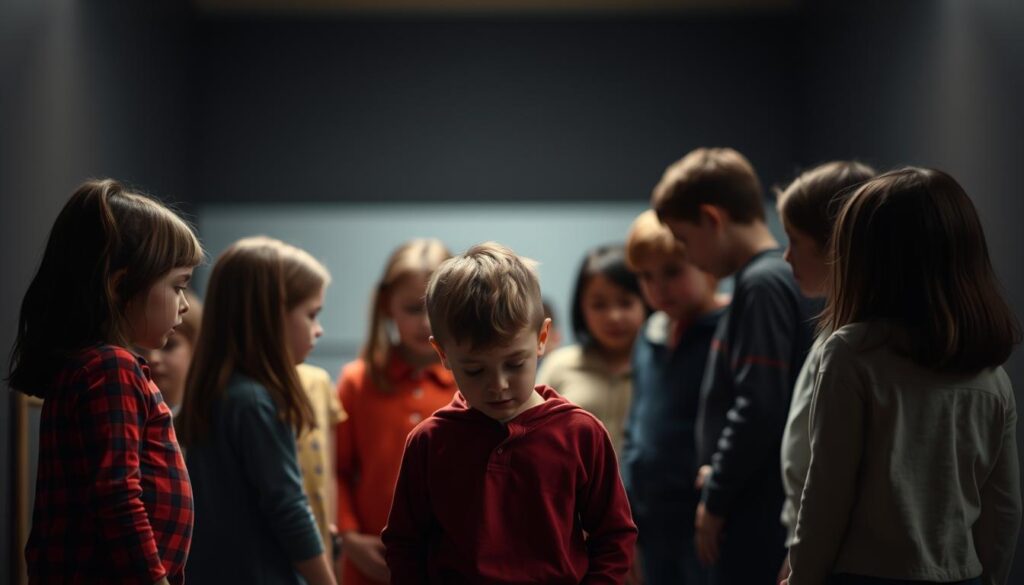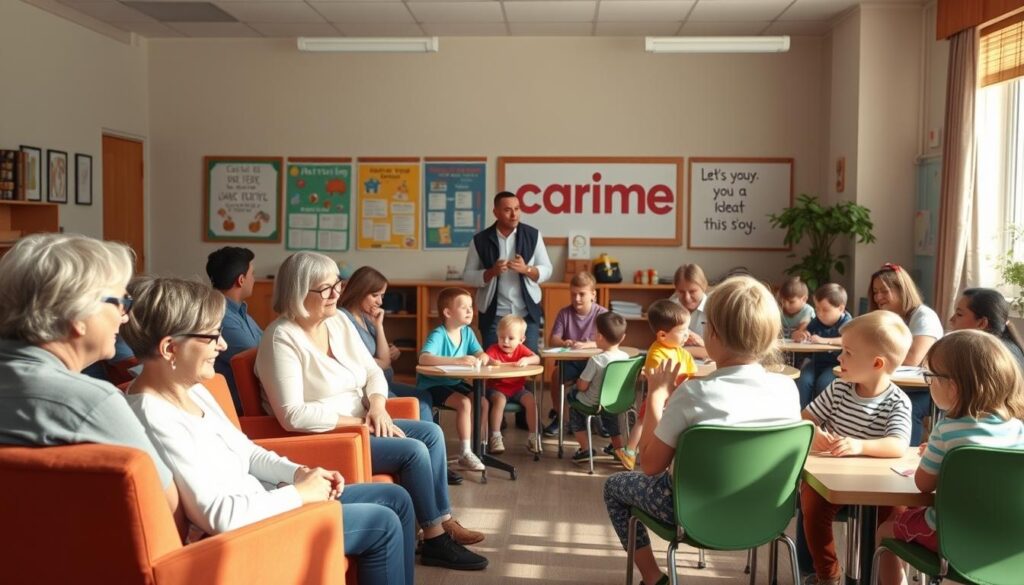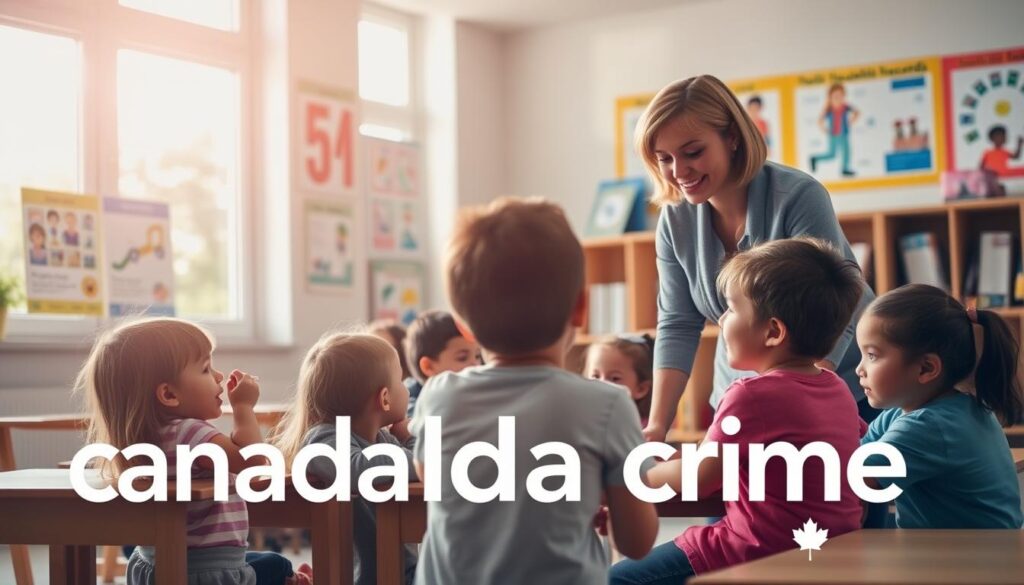Did you know a recent study shows over 70% of parents worry about their kids’ morals in today’s digital world? Parents face challenges in protecting their kids from negative influences today. Issues like bad media, peer pressure, and losing moral values are big concerns. This guide offers ways to help kids keep strong morals and become good adults.
Raising kids with good morals and ethics is key to keeping them on the right path. It’s important for creating a place where kids can grow up right and kind. This sets them up for a successful and caring future.
Understanding the Challenges of Modern Parent-Child Relationships
Parenting today is tough due to new technology, societal changes, and different family dynamics. Parents face a new world where traditional values keep changing. Looking back at how parents used to lead can give us insights into today’s challenges.
Historical Context of Parental Authority
In the past, parents were seen as the main guides for their kids’ morals. Strong families and close communities backed up this role, providing great support. The rules for parenting were clear, making it easier to teach values and morals.
Impact of Modern Society on Child Development
Today, parents deal with obstacles that didn’t exist before. The fast pace of tech changes exposes kids to lots of different, and sometimes bad, content. Also, the loss of traditional communities means less support for everyone.
This makes understanding present-day parenting issues important. As the world of tech grows, parents must work harder to keep their kids on the right path. There are more challenges that can slow down a child’s healthy growth.
Tips to Prevent Corrupting Morals of a Child
In today’s fast-paced world, teaching children right from wrong and the importance of family values is crucial. These steps guide them towards being morally good people. It’s about giving clear advice on being ethical and being consistent in how you parent.

Establishing Strong Family Values
Family values begin with parents being good role models. Kids look up to their parents for direction. So, it’s important to act in ways that show strong morals.
Talking often about what your family stands for and taking part in traditions helps build a sense of unity and purpose. This makes it easier to teach kids about being virtuous.
Promoting Ethical Upbringing and Instilling Virtues
Teaching ethics is more than just making rules; it’s about being involved in your child’s learning about what’s right and wrong. Having open talks about the importance of honesty and considering how our actions affect others are key.
Praise your child when they do something morally good. Also, get them involved in helping the community. This provides real-life chances to practice what you’ve taught them about values and ethics.
The Role of Education in Safeguarding Morals
Schools play a key role in shaping students’ moral values. They teach important principles like honesty and integrity, not just book smarts. This helps build a strong moral foundation.
Combating Corruption in Schools
Corruption in education must be tackled to ensure a fair and ethical learning space. Schools should enforce rules strictly, value honesty, and teach about fighting corruption. The GRACE initiative shows how young people can help stop corruption.
Importance of Transparency and Accountability

Being open and accountable is key to keeping schools moral. Schools should ensure everyone knows what’s happening and that rules are clear. The UNODC offers resources to help teach these values.
By mixing strong anti-corruption actions with a push for openness, schools can build a moral base. This ensures students learn in a place that values honesty and ethical behavior.
Positive Influence through Community Engagement
Getting involved in community programs can really improve how a child grows up. Being part of services, events, and workshops makes kids feel like they belong and have responsibilities. These activities pair well with what kids learn about right and wrong at home and school. They also offer extra support against bad influences.

In areas with strong community programs, there was a 31% drop in repeat crimes. It shows how much positive role models in the community can help. Websites like CanadaCrime.ca are tools that track crimes and give help.
Detailed data show that targeted efforts can make a big difference:
| Metric | Impact |
|---|---|
| Reduction in repeat offenses | 31% |
| Targeted religious minorities | 37% |
| Involved disability biases | 22% |
| Drop in racially motivated vandalism (since 2015) | 40% |
Fighting hate crimes and uplifting positive community figures are key. Being actively involved offers moral support from the community and creates a welcoming place. By joining local efforts, you help create a safer, more caring space. This lets our kids and others gain from being part of the community and do well.
Impact of Digital Media and How to Mitigate It
In today’s digital age, the impact of digital media on children is profound. Technology brings both educational content and entertainment. It’s vital to use it positively and reduce its bad effects. Setting clear internet use limits and monitoring what kids do online helps. This makes the internet safer and better for them.
Setting Boundaries for Internet Use
It’s crucial to set rules for how kids use the internet. Decide on specific times for internet access and limit screen time. Tools from Google and Apple can watch and limit access to bad content.
“Supervising children’s online activities is key. Educating them about potential dangers and encouraging them to discuss their online experiences can foster a safer digital environment,” advises Katherine Bindley, a technology journalist at The Wall Street Journal.
Encouraging Positive Digital Content
Steering kids towards positive digital content for kids is important. Sites like PBS Kids and National Geographic Kids have great learning content. Talking about what they see online helps them understand what’s good and what’s not.

| Action | Description |
|---|---|
| Set Time Limits | Restrict internet usage to specific times and durations each day. |
| Use Parental Controls | Implement tools to monitor and filter content your children can access. |
| Promote Educational Content | Encourage the use of apps and websites that provide educational and enriching experiences. |
| Discuss Online Safety | Have conversations about the potential dangers and misrepresentations online. |
Dealing with Peer Pressure and External Influences
Peer pressure can seriously affect a child’s actions and ethical choices. It’s crucial to teach kids how to deal with peer pressure and external forces. By using role-play and talking about true stories, we can boost their confidence and help them make better decisions.

To fight peer pressure, boosting your child’s confidence is key. Here are some ways:
- Have open talks about common external pressures kids face.
- Build a strong self-worth and resilience against peer pressure.
It’s also important to highlight the value of making moral choices. Kids with a strong sense of right and wrong are less likely to give in to peer pressure. Encourage them to stick to their beliefs and choose wisely, even when outside pressures are strong.
By giving kids the tools they need, we empower them. They’ll be able to handle peer pressure and navigate social challenges confidently and with good morals.
Strengthening Emotional Bonds within the Family
Building strong connections in the family is key for a child’s growth. Parents should talk openly and often. This way, they make a space that’s caring and promotes trust and love without conditions.
The Importance of Open Communication
Talking openly is essential for building trust with kids. When parents really listen and talk deeply, kids feel important and heard. They are more likely to share their thoughts and worries freely.

Building Trust and Unconditional Love
Trust and love without limits are crucial for tight family ties. Parents who show they are dependable and loving help make a home where kids feel safe. This safety net lets kids face challenges better and stay true to their family’s beliefs and morals.
In the end, growing strong family connections with open talks and trust is critical. It makes sure kids grow feeling supported and cherished at every step.
Rules and Discipline for a Balanced Upbringing
To help kids grow up well, it’s key to have a setup with good discipline and clear rules. This way, children know their limits, feel safe, and learn to be responsible.
Creating Effective and Clear Rules
When making rules for kids, be clear and keep things simple. Rules need to be right for their age and easy to get. Get your kids involved in making these rules. This empowers them and makes them more likely to follow the rules. Effective childhood discipline comes from understanding what is expected from both sides.

Consistent Enforcement of Discipline
Staying consistent with effective childhood discipline is crucial. After setting the rules, apply them the same way every time to avoid confusion. Make sure the consequences for not following rules are fair and steady. Being consistent helps kids connect their actions with what happens next. This shows the importance of having structure.
- Clear expectations and rules make kids feel secure.
- Having kids help with the rules encourages teamwork.
- Being consistent ensures lessons stick and are followed.
Keeping a balance between making clear rules and applying them consistently builds a supportive and positive environment. This approach helps children do well, knowing they can explore and grow within clear limits.
Training and Education for Parents and Guardians
Today’s world is changing fast, and raising kids to be moral beings takes more than just guesswork. It needs structured training and ongoing education for parents and guardians. Programs for parent education play a key role in giving caregivers the knowledge and skills they need to handle the challenges of modern parenting.
Workshops and seminars offer great support to parents facing current parenting issues. They cover things like understanding what digital footprints are and how to deal with ethical problems. In these sessions, parents learn ways to improve communication, teach morals, and build a strong family.

Also, it’s crucial for guardians to receive moral training to help shape today’s kids into good people. These programs dive into topics on morality, ethics, and values, encouraging parents and guardians to set a good example. Courses on how to be better parents are also available, giving tips on creating a supportive atmosphere where kids can grow their moral and ethical values.
| Type of Program | Focus | Benefits |
|---|---|---|
| Parent Education Programs | Modern Parenting Challenges | Improved Communication, Understanding Child Psychology |
| Guardian Moral Training | Morality and Ethics | Instilling Strong Values |
| Parenting Improvement Courses | Practical Parenting Strategies | Effective Parenting Techniques |
Creating a Safe and Positive Environment
Making sure kids are safe and happy involves detailed child safety rules. It’s key to create a good place for them, focusing on both their emotional and physical well-being. This includes setting up the right steps and training people who care for kids regularly.
Policies and Procedures for Safeguarding Children
Child safety policies play a huge role in keeping kids safe. These rules should clearly explain how to protect kids from harm at home, school, or anywhere else. Things like regular background checks, being ready for emergencies, and having a clear way to report any abuse are part of effective policies.
These safety rules also stress the need for positive spaces for kids. Spaces where they feel secure, supported, and appreciated are important. Keeping these policies up-to-date ensures they work well and stay relevant.

Regular Training for Caregivers and Educators
It’s very important to give regular training to those who teach and care for kids. This training should include how to spot and deal with abuse, how to use child safety rules, and how to make positive environments for children. Continuous learning helps caregivers keep up with the best ways to look after kids and new dangers they might face.
Providing this training means everyone involved in a child’s life knows how to keep them safe. It also builds a sense of duty and care, making safety measures stronger.
To sum up, having solid child safety rules, clear steps, and ongoing training for those looking after kids is key to a safe and happy environment for children. These steps are the base for a caring and encouraging place where children can do well.
Conclusion
Protecting a child’s morals in today’s complex world needs hard work from parents, teachers, and the community. By using the strategies mentioned, families can help their kids grow strong moral values. This builds a solid base for a morally strong adulthood.
This article shows the importance of understanding parent-child relationship dynamics today. It states the need for open and reliable educational methods. Plus, it stresses keeping strong family values. It also highlights the importance of setting rules for digital media. And it talks about the value of positive community activities for ethical child-rearing.
Strong family connections and steady rules and discipline are key to a safe and positive place for kids to grow morally. By sticking to these ethical child-rearing practices, parents and caregivers can raise thoughtful and principled individuals. This strengthens family values, which helps society.

